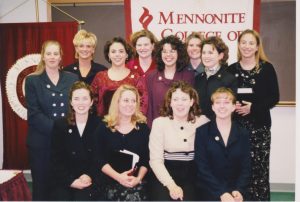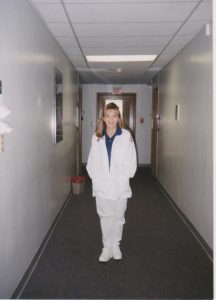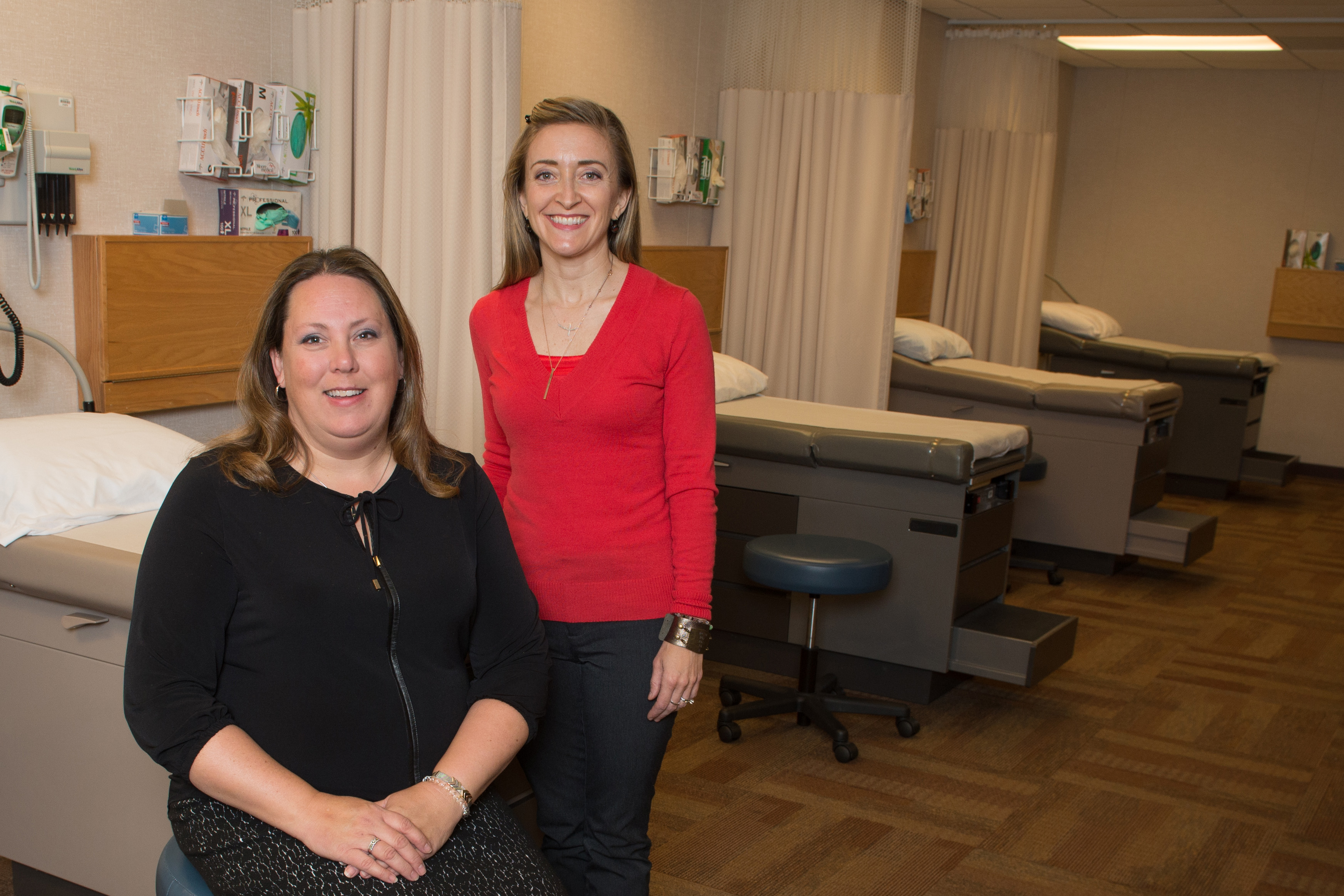The continuing mission of Mennonite College of Nursing (MCN) is to prepare exceptional nurses that passionately work to improve health outcomes, both in their communities and globally. Many pieces must come together in order to see success in that mission. Recruitment of excellent students, high curricular standards, and engaged alumni are all pieces, but our mission cannot be accomplished without excellence and innovation from our faculty and staff.
That means that recruiting the best and brightest is key.
When that talent happens to also come in the shape of Mennonite College of Nursing alumni—that is just icing on the cake.
Mennonite College of Nursing is proud to announce the return home of alumni Valerie Wright, B.S.N. ’99, and Becky LaMont, B.S.N. ’98, M.S.N. ’07.
Wright is MCN’s director for Undergraduate Programs. She has her Doctorate of Nursing Practice, RN and CNE (certified nurse educator), and is passionate about obstetrics, leadership, and neonatal intensive care.
LaMont is MCN’s Success Plan coordinator. She has her Master of Science in Nursing, RN and CNE.
We caught up with them to weigh in on their experience here, what brought them home, and what they hope to accomplish going forward.

MCN graduating class of December of 1998. LaMont is in the first row, second from the right.
(MCN) Let’s start light—tell us a bit about yourselves. Maybe something people wouldn’t ordinarily know?
Wright: I grew up on a farm outside of Paxton, Illinois. In first grade, my teacher made us write down what we wanted to be when we grew up. I wrote that I wanted to be a nurse, and wanted to work with babies. (Wright spent 15 years as a neonatal intensive care nurse working with babies at Carle Foundation Hospital.)
Something most people don’t know? I teach yoga, and did my teacher training in Costa Rica.
LaMont: I was born and raised here in Normal, so I guess you can say I am a townie? And, when I was in grade school, I attended classes here in a program called College for Youth. So you could argue that I’m a Redbird returning home twice.
Tell us a bit about what you do here now.
LaMont: Boiled down, I help students succeed. I work in tandem with our program directors and academic advisors in order to help ensure students have access to the resources necessary to thrive. Sometimes students have a hard time balancing everything, and nursing school can be quite different from previous course work. When a high achieving student doesn’t hit the marks they are used to with the methods that worked for them in the past, it can be anxiety provoking. My goal is to help support these future Redbird nurses.
Wright: As the undergraduate director, it is my job to ensure the success of our students and the undergraduate program as a whole. I truly feel blessed to help lead a program that I attended almost 20 years ago, and I do not take that responsibility lightly. It is my hope that I will “carry the torch” of the outstanding MCN tradition for many years to come.
You both did your undergrad at Mennonite College of Nursing. What drew you here initially, and/or what brought you back?
LaMont: Honestly, I was not a traditional student at MCN. I did my first two years of college here at ISU and was even in the Gamma Phi Circus. I moved away for a few years and then came back to the community. I finished a few courses at Heartland Community College then entered MCN. I think because of my experiences, I have an appreciation for nontraditional students now.
What brought me back? I always wanted to teach or to become a nurse, so it is funny that now I do both. And who doesn’t want to be a Redbird?
Wright: I really wanted some place that I could call home for the rest of my working career. Leaving Carle Foundation Hospital was really hard for me; I was there for 15 years. But I was recruited by Danville Area Community College to be their director, and I was like, “OK, you’ve got to step outside your comfort zone, and go and do it.” Plus, the office was painted pink.
There are a lot of people who career hop—I do not want that. All of my experiences have led me here. I wanted a place I could call home, and it is just great that Mennonite College of Nursing WAS my home.
What do you think makes Mennonite College of Nursing different? Did your experience prepare you in any way that you think was unique?

Wright in Troyer Hall on her first day of clinical.
LaMont: I feel like I finished with a level of professional polish that allowed me to handle things that were uncomfortable. I was able to be collaborative and forward-thinking. I knew how to not just solve problems at face value but be a real advocate for the patient.
Wright: I feel like I got a very well-rounded education here. I also was on top of what I wanted to do; I knew I wanted to work in neonatal intensive care (NICU). Brenda Lesson was here at the time, and I knew she worked in NICU. I did an independent study for a week at St. Francis, in their NICU. I also did neonatal resuscitation; nobody made me do that. I looked for opportunities to make me more marketable.
I think one of the greatest strengths here is the caring and compassion that comes from the faculty as well as their dedication to excellence. Even when I was working at Carle Foundation Hospital, I could see that MCN students were a cut above the rest. We would have leadership meetings, and the MCN students always stood out. Not because they were forced to, but because it was just the culture.
We can all agree that health care, as an industry, is shifting. What do you see as the biggest challenge faced by nurses?
Wright: I think the biggest challenge is that as our population continues to age, we do not have spaces for them in hospitals, nor are there enough nurses to care for them. We HAVE to focus on wellness prevention. And we are so far away from that. Patients are no longer admitted to the hospital with just one condition. They have multiple diagnosis and are severely ill. As an industry, we do not do enough education or promotion of nutrition or exercise. It’s just, ‘Take this pill. … Take that pill.’ And all of the sudden the person needs 20 pills. Nurses have a unique opportunity to change the culture of our health care industry in promoting health and wellness.
LaMont: Nurses are aging out. Which means it is a good time to be a nurse because hiring is vibrant, but there is a high need for nursing. Specifically, community-based nursing and high-end critical care.
With those challenges in mind, what do you see as the biggest opportunities for nurses?
Wright: Nurses have the ability to influence people to change. And I think we have a unique ability to teach our students how to influence people. It does not take a master’s degree or a doctoral degree to teach somebody proper eating or exercise. But you have to influence them to want it. That is where we are falling short.
LaMont: MCN’s America’s Promise integration hits on the above nicely. The program is teaching the leadership skills necessary to take public health initiatives and drive them forward.
Finally, if you could give one piece of advice to our young students, what would that be?
LaMont: Read more than necessary. We all try to find some magic something that’s going to put the knowledge in our head. And, while there are many apps, videos and study books that will help, old school reading and note-taking are still critical to success.
Wright: What’s your why?
If you do not have a solid “Why,” it is going to be really hard to make it through. When you are up at 2 a.m. studying for a pathophysiology test, and all of you friends are going out and enjoying “Thirsty Thursday,” you better have a good why.
Those students with a solid why—maybe their dad had cancer and the nurse taking care of him had an impact on them, or maybe their mom was a nurse—those are the students that are going to do whatever it takes to make it through. So I always ask my students, “What’s your why? Why do you want to be a nurse? What makes you passionate about nursing?” I then encourage them to constantly remind themselves of their why, especially during the trying times in nursing school.
This story was originally printed as part of MCN’s 2016-2017 Annual Report. To view the full report, click here.
MCN is providing leadership in nursing—Learn more.
Our undergraduate programs
Our graduate programs

